Key takeaways:
- Indie writing allows authors to maintain full creative control over their work, leading to a unique and empowering publishing experience.
- Personal experiences, community support, and inspiration from reading and art play crucial roles in motivating indie writers and shaping their narratives.
- Setting achievable goals and fostering vulnerability in writing can enhance creativity and sustain motivation throughout the writing process.
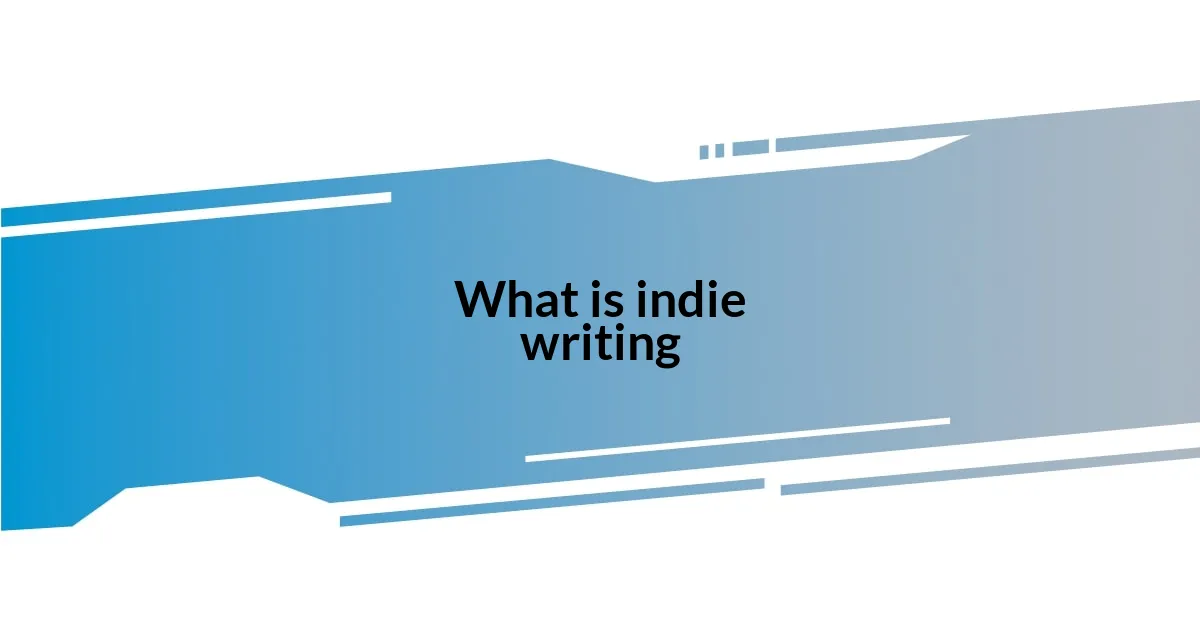
What is indie writing
Indie writing, or independent writing, refers to the practice of authors publishing their work without the backing of a traditional publishing house. I remember the first time I decided to self-publish my short stories; it felt like taking a leap into the unknown. The freedom to create and share my voice with readers directly was exhilarating, yet daunting.
What truly sets indie writing apart is the creative control it affords the author. Imagine having the final say in everything—from cover design to marketing strategies. I’ve found myself pouring over various covers, testing titles, and experimenting with different platforms to get my work into the hands of readers, and it’s incredibly empowering.
In my journey, I’ve discovered that indie writing can be as much about community as it is about individual expression. Engaging with other writers and readers has shown me that there’s support in this path, whether it’s through social media or local writing groups. Have you ever felt a surge of inspiration after sharing your work? That shared energy is a significant part of the indie writing experience that can often get overlooked.

Key inspirations for indie writers
As an indie writer, I often draw inspiration from the world around me. Whether it’s a bustling café where I jot down ideas while sipping coffee or a quiet park where I find solace, my environment plays a crucial role in fueling my creativity. I recall a particular afternoon spent watching the leaves flutter in the breeze, where suddenly, a story idea bloomed in my mind, sparked by the simple beauty of nature.
Here are some key inspirations that resonate with many indie writers:
- Personal Experiences: Life events can shape our narratives, allowing readers to connect with the authenticity of our stories.
- Community Impact: Witnessing the struggles and triumphs of those around me has motivated me to write about real-life issues.
- Diverse Genres: Exploring various genres opens up new avenues for creativity, pushing me to experiment with my writing style.
- Art and Music: Visual art and melodies often evoke emotions that translate beautifully into words, enhancing my storytelling.
- Literary Influence: Reading works from indie authors inspires me to embrace my unique voice, showing that unconventional paths can lead to extraordinary tales.
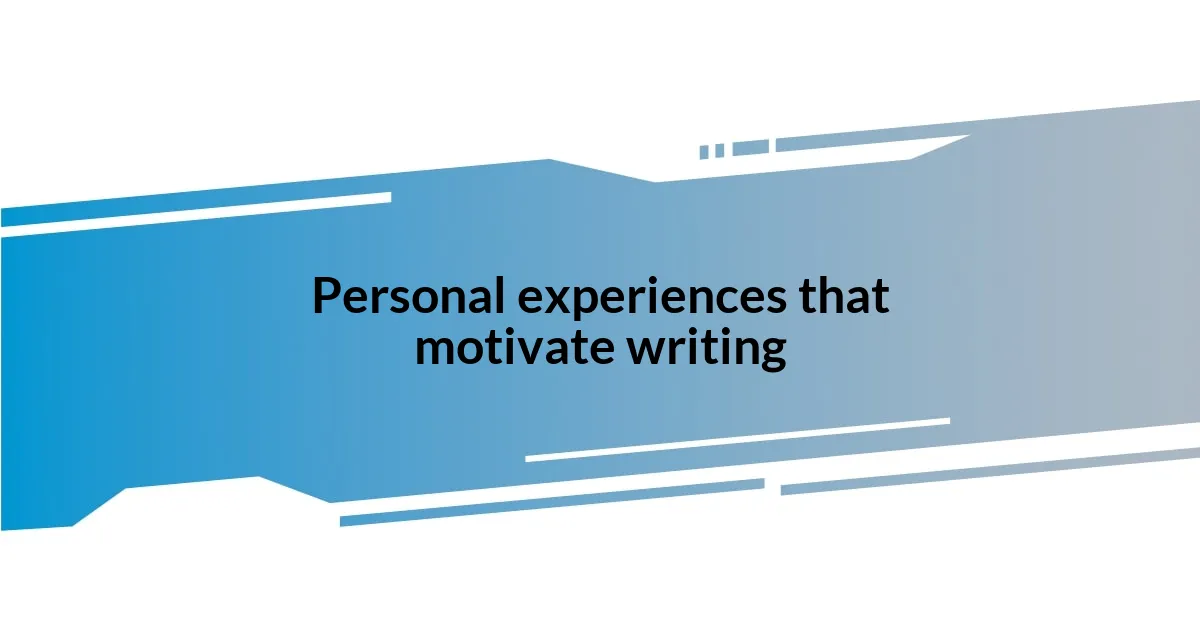
Personal experiences that motivate writing
When I think about the personal experiences that motivate my writing, I’m often reminded of specific moments in my life that felt pivotal. For instance, after going through a challenging breakup, I found solace in writing—transforming my heartache into powerful prose. This process not only helped me heal but also empowered me to create narratives that resonate with feelings of loss and recovery. It’s incredible how our pain can fuel our creativity, enabling us to share heartfelt stories that touch others.
Traveling has also significantly influenced my writing approach. I remember wandering through the cobblestone streets of an ancient city and feeling as if the walls had a hundred tales to tell. The vibrant cultures and encounters with diverse individuals deeply inspired me to weave those experiences into the fabric of my stories. Each place I visit brings a fresh perspective, turning my travel journal into a treasure trove of inspiration.
Moreover, family histories serve as a rich backdrop for my narratives. I often find myself sitting with my grandparents, listening to their tales from a different era. These narratives are not just stories; they are a window into the past, filled with lessons and legacies. By infusing my writings with these personal histories, I create a bridge between generations, allowing readers to experience the nuances of time through characters that leap off the page.
| Experience | Impact on Writing |
|---|---|
| Breakup | Transformed pain into powerful prose |
| Travel | Inspired diverse cultural narratives |
| Family Histories | Connected past lessons to contemporary themes |
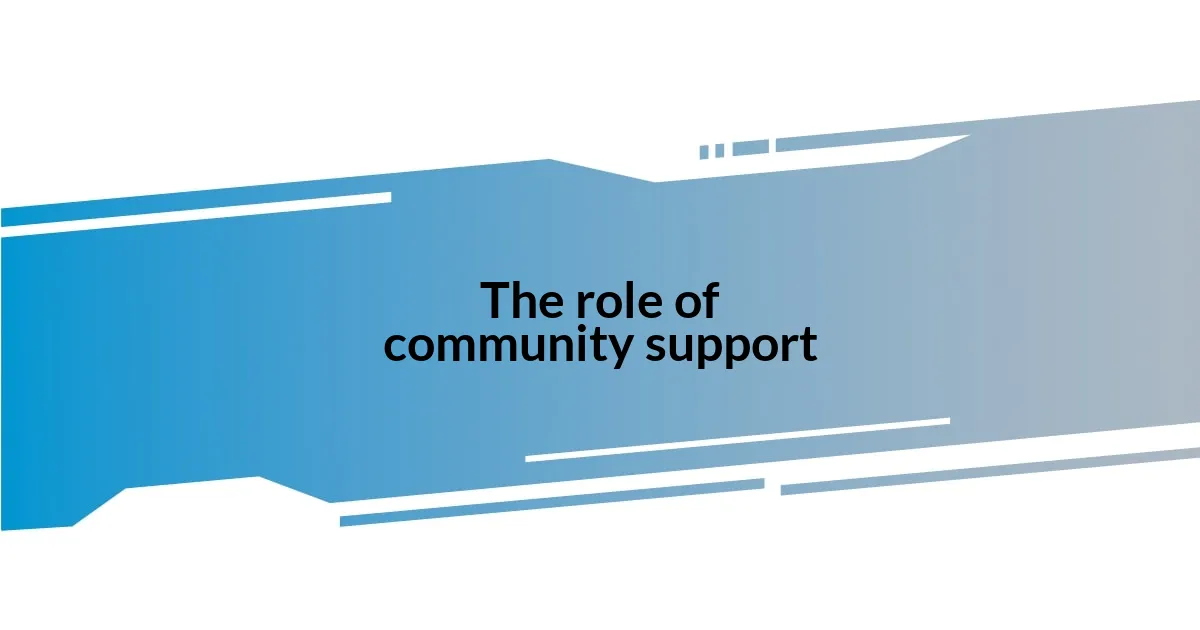
The role of community support
The beauty of community support is something I’ve experienced firsthand throughout my indie writing journey. I remember attending a local writers’ group for the first time, feeling a mix of excitement and apprehension. The warmth and encouragement I received from fellow writers uplifted my spirits and sparked a renewed passion for my craft. How often do we underestimate the power of a kind word or a shared struggle?
As we share our stories and challenges, a sense of camaraderie develops that’s both comforting and empowering. I often find myself inspired by the triumphs and vulnerabilities of others in my community. Listening to a fellow writer share their journey through self-doubt reminded me that it’s okay to feel unsure sometimes. Those moments have motivated me to persevere, reinforcing the idea that we’re all navigating similar paths.
Moreover, engaging with my community often prompts me to explore topics I never would have considered alone. I recall a discussion about mental health in literature that opened my eyes to new perspectives. It was enlightening to hear diverse viewpoints and realize how our collective experiences can shape the narratives we write. It makes me wonder—what new stories could emerge if we continued to lean on each other?
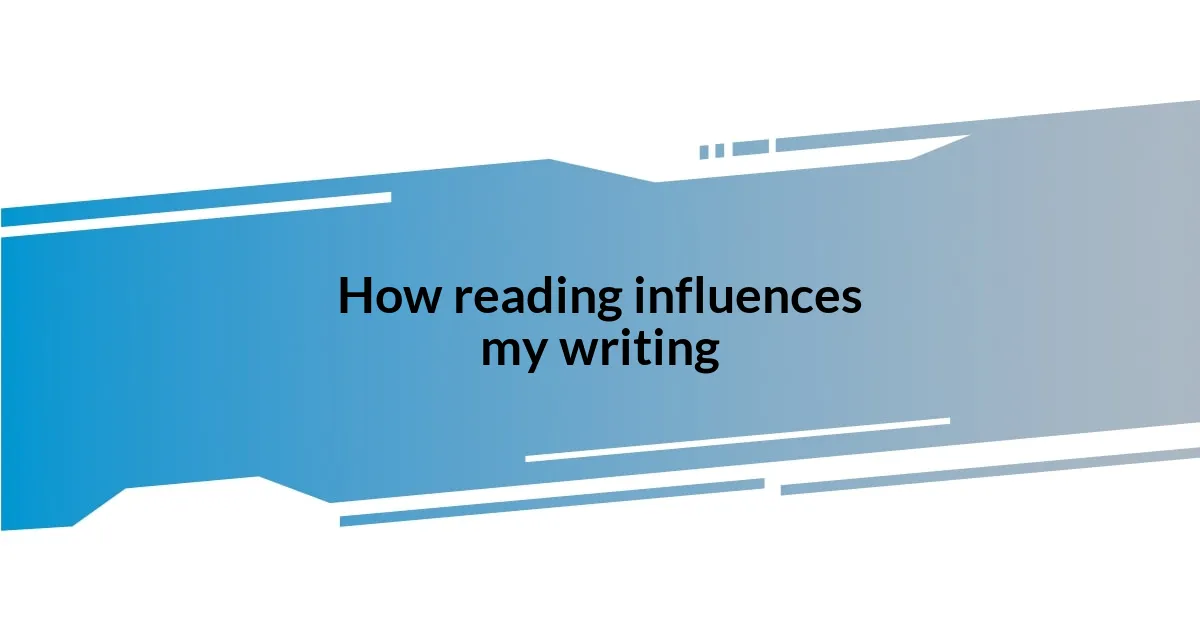
How reading influences my writing
Reading profoundly shapes my writing style and thematic choices. I recall devouring novels late into the night, feeling drawn into intricate worlds crafted by skilled authors. Each turn of phrase and character arc taught me the power of language and how it can evoke deep emotions. It’s fascinating how a well-placed metaphor can stick with me for days, influencing not just what I write, but how I express those ideas.
Some of my favorite books have challenged my perspectives and pushed me to explore new genres. For instance, after reading a gripping memoir, I felt compelled to infuse more authenticity and vulnerability into my own work. I often find myself asking: how can I meld my voice with the raw honesty I’ve encountered in those pages? This reflection helps me steer away from complacency and invites me to remain true to myself while embracing new themes.
The beauty of reading is that it sparks conversations within me. After immersing myself in a thought-provoking story, it’s not uncommon for me to jot down questions regarding character motivation or plot development. These questions guide my writing process, serving as a catalyst for deeper exploration. Have you ever finished a book and felt an insatiable urge to create something of your own? It’s this drive that pushes me to write stories that resonate, inspired by those authors who’ve left a lasting impact on my journey.
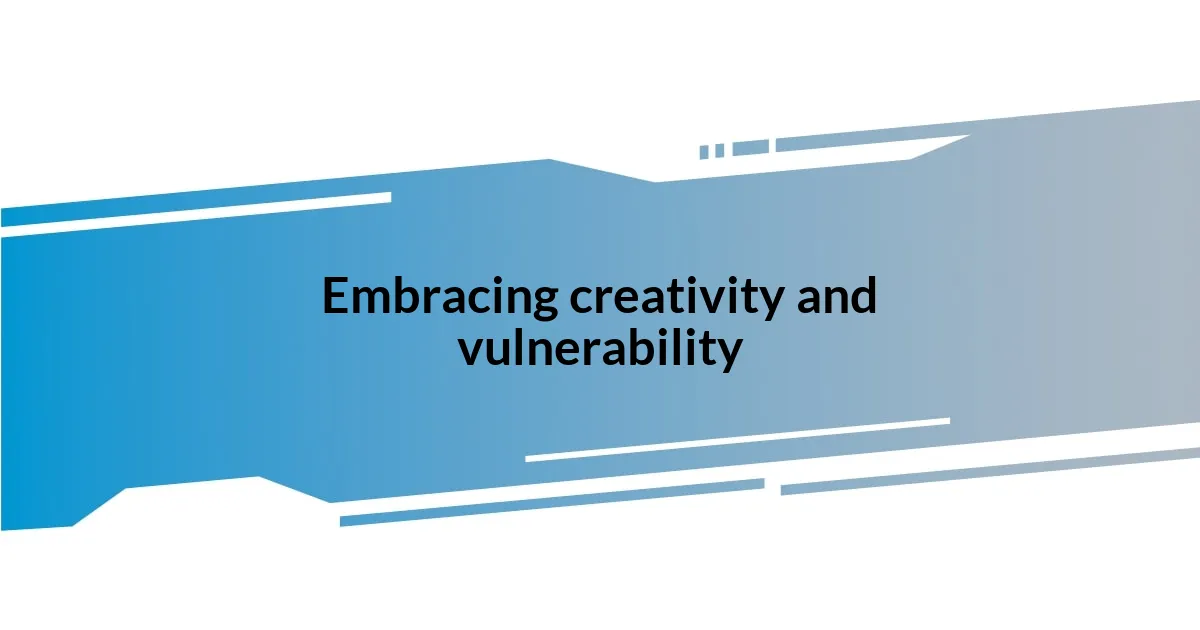
Embracing creativity and vulnerability
Embracing creativity and vulnerability is a dance of sorts, where one must be willing to let down their guard. I recall the time I penned a short story based on a deeply personal experience—sharing my struggles with anxiety. The act of putting my thoughts onto paper felt daunting, yet liberating. Isn’t it fascinating how laying your soul bare can foster connection with readers in ways I never anticipated?
When I allow myself to be vulnerable, I discover layers of creativity that remain hidden behind walls of fear. A moment stands out when I shared a raw, unedited poem at an open mic night. The room fell silent, and for a few heartbeats, I felt exposed. Yet afterward, several attendees approached me, sharing their own similar stories. It made me realize: how often do we shy away from our truth when it can inspire others?
Through this journey, I’ve come to understand that creativity thrives in the spaces where we feel most vulnerable. I often wonder how many stories remain untold because we fear judgment. When I overcome that fear and embrace my authentic voice, new avenues for expression open up. It’s almost like unlocking a treasure chest of ideas, waiting to be explored.

Setting goals to stay inspired
Setting goals to stay inspired is essential in my journey as an indie writer. I often find myself setting both short-term and long-term goals to keep the creative juices flowing. For instance, I remember a season when I decided to write one short story each week. The thrill of completing those mini-projects reignited my passion and gave me a tangible sense of achievement. Have you ever set a small writing goal that brought you unexpected joy?
I also believe in the importance of revisiting my goals regularly. There was a time when I aimed only to finish a novel without breaking it down into manageable steps. By switching to monthly milestones—like completing a chapter or refining particular sections—I discovered that each small success helped sustain my motivation. Do you think having clear, actionable steps could encourage you too?
Finally, surrounding myself with a supportive community has been a game changer. I recall joining a writers’ group where we shared our goals, offered accountability, and celebrated each other’s progress. This collaboration adds an element of excitement to my writing journey, making me wonder: how might your own creativity blossom through communal support? Setting goals not only keeps my inspiration alive but transforms my writing into a shared adventure.
